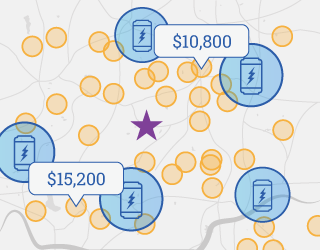As interest in energy storage increases from homeowners across the country, more and more solar equipment manufacturers are beginning to offer their own energy storage solutions. In fact, a number of solar inverter companies have recently launched, or are on the verge of releasing their own energy storage systems. Here’s a list of the storage options developed by inverter manufacturers that are currently or soon-to-be-available for homeowners in the US.
Enphase
A leading manufacturer of microinverters, Enphase also provides AC-coupled energy storage solutions in two different sizes: the 3.36 kilowatt-hour (kWh) Encharge 3 and the 10.08 kWh Encharge 10, which is similar in size to the two most widely installed batteries available today – the LG Chem RESU 10H and the Tesla Powerwall 2. When combined with the entire suite of Enphase products–from the IQ combiner box to the Enpower smart switch and IQ series microinverters–the Enphase batteries become the “Ensemble” system. We include the Encharge on our list of best solar batteries and you can find it on the EnergySage Buyer’s Guide.
Delta
Over the last couple of years, Taiwanese manufacturer Delta Electronics has entered the US residential solar market with their residential inverters: according to Tracking the Sun data, in 2018 these inverters were almost exclusively installed by Tesla.
Additionally, the company has historically provided energy storage solutions for larger-scale commercial and utility applications, offering energy storage systems up to two megawatts in capacity. At Solar Power International 2019, the company unveiled the Delta One-Box, bringing their experience with energy storage systems to the residential scale. While the product does not yet appear to be available in the US, we will add it to the EnergySage Buyer’s Guide once it is released.
SMA
While SMA does not (yet) manufacture their own energy storage solution, they are worth including on this list for two primary reasons. First, SMA offers a storage-specific battery inverter, which makes integrating a battery into a solar panel system very easy to do. Second, one of the primary reasons solar shoppers are interested in adding storage is to be able to continue to use the electricity produced by their panels in the event of an outage. The SMA Sunny Boy US series is the only inverter currently available that actively allows solar owners to do so, if only on a small scale.
The Sunny Boy US inverters, which are available for three kilowatt (kW) to 7.7 kW AC systems, come with a capability called “Secure Power Supply”, which allows you to use up to 2,000 Watts of power while your solar panels are producing during a grid outage. Notably, this doesn’t allow you to keep any solar produced for later use, but it does allow for what SMA refers to as “opportunity power”, which can provide a sunny-day respite from a grid outage.
SolarEdge
While SolarEdge does not currently have their own commercially available energy storage solution, they also belong on this list for two reasons. On the one hand, SolarEdge has designed a residential battery inverter–StorEdge–specifically for use with the LG Chem RESU 10H. LG Chem’s battery is one of the most popular residential storage systems in the US today, according to California distributed generation interconnection statistics.
What’s more, in 2018, SolarEdge purchased Kokam, a lithium-ion battery cell, battery and energy storage solution manufacturer. This acquisition is indicative of SolarEdge’s commitment to bringing their own branded storage solution to market in the near future.
Why purchase a battery from an inverter manufacturer?
Inverters and energy storage systems are a very natural pairing. Regardless of whether you design a solar-plus-storage system to be AC coupled or DC coupled, at some point, the direct current electricity from your solar panels will need to be inverted into the alternating current electricity for use in your home or business. As a result, your solar inverter and battery will need to work closely together and communicate with each other in order to ensure that your solar electricity and stored energy are used most effectively.
While most energy storage solutions are compatible with most solar inverters available on the residential market today, inverter manufacturing companies are hoping to both ease the installation process and increase sales by providing integrated inverter plus energy storage solutions that can be installed together seamlessly.
Explore your solar and storage options with EnergySage
On EnergySage, you can explore your options for solar panels, inverters, and batteries, using our Buyer’s Guide to research and compare different equipment available on the market today. It’s easy to receive custom quotes from local installers for specific equipment on EnergySage: when you register for a free account on the Marketplace, simply indicate which equipment you’re interested in and we’ll let our installer network know so they can provide quotes that best fit your needs and preferences.






